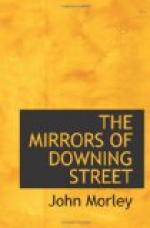There was no man less embittered by failure and disappointment. He seems to have had reason to believe that Mr. Lloyd George frustrated his early efforts as a politician, indeed he told me more than once that Mr. Lloyd George had deliberately set himself to that end; and yet it was at Mr. Lloyd George’s earnest beseeching that he accepted the office of Food Controller, and once a member of his Cabinet, he seldom spoke of this old opponent without the warmest admiration. “You can’t trust him a yard,” he said to me on one occasion laughing very good-naturedly; “but there is not a man in the Government who can hold a candle to him for courage and inspiration. I know very well that I could never have done what he has done. More than any man in the country he has pulled us through the critical days of the war. He is wonderful—nothing short of wonderful—and sometimes I feel almost fond of him, for he has many likeable sides to his character; all the same, I know very well he is not to be trusted. I took office on certain conditions, not one of which has he observed. He is one of those men with whom you cannot deal confidently.”
This was the bitterest thing I ever heard him say of his former enemy. As regards the old days in the House of Commons, he told me that there was room for only one leader in Wales, and that, while Mr. Lloyd George could speak, he couldn’t, and so Mr. Lloyd George, who was consumed by personal ambition, had won the battle. In saying this he smiled like a boy, and only grew serious when he added of those wasted years, “The bother is I had a lot of useful things I wanted to do for the country.”
He was convinced that he could have paid off the whole of the National Debt during those years.
A good judge of statesmen said of Lord Rhondda that he would have made the greatest Chancellor of the Exchequer these islands had ever possessed. I do not think there can be any doubt of this, for his genius lay in figures and he had extraordinary swiftness in seeing his way through expensive chaos to economical order. His mind was constructive, if not positively creative. He was never happier—except when birds’-nesting or romping with young people—than when he was in an arm-chair working out with pencil and paper some problem of administration which involved enormous figures. He would sit up to the small hours of the morning over his work, and would come down to breakfast radiant with happiness, bursting with energy, exclaiming, “I had a glorious time last night!” Certainly he would have brought to the Treasury an original mind, and a mind, moreover, profoundly acquainted with the activities of trade and commerce—those important factors in national finance which appear to cut so small a figure in the minds of bankers and officials.




